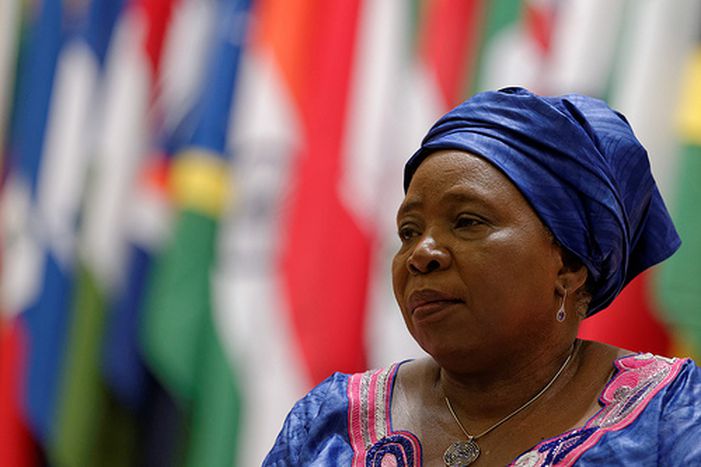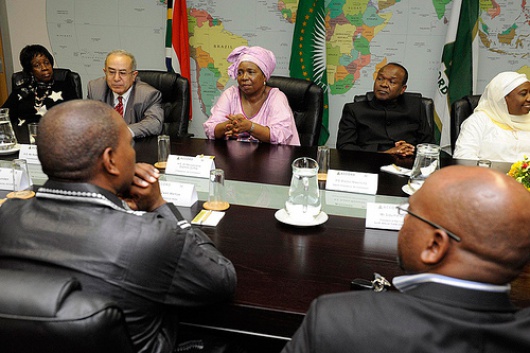
Nkosazana Dlamini Zuma, The African 'Iron Lady'
Published on
Translation by:
Samantha KelloggPress conferences that follow big summits have us accustomed to promises about big pacts and enormous numbers for economic cooperation. That's why it comes as a shock to find a woman like Nkosazana Dlamini Zuma, the chairperson of the African Union (AU) Commission, that is down to earth and refers to people as individuals.
At the press conference of the latest summit between the European Union and Africa, Dlamini Zuma didn't detail the agreements that were previously analysed by Barroso, Van Rompuy and Mohamed Ould Abdel Aziz, presidents of the Commission, the European Council and the African Union (AU) respectively. Amongst so many leaders and presidents, Dlamini Zuma's spontaneity and humanity were emphasised. She spoke to the press without a printed speech.
In her speech she explained how young African students with training are welcome in Europe, while those without marks die at sea or in the desert: “If we focus our efforts on our young people's training, we wouldn't live to see any more cases like Lampedusa. They would only enter Europe via airports”. Dlamini Zuma emphasises the comparative advantages between Europe and Africa, the latter being a continent with vast tracts of arable land, large, unexplored fishing areas, a population pyramid of rapid growth and a major tourist attraction.
Through her words, a continent with suffering and difficulties was seen, yes, but also a continent with tremendous potential if we act as one to achieve pacification and democratisation in all countries. Her unhurried, pensive speech ended with the idea that “this is the time to really implement what we've touched upon and thus become two great continents”.
A Female Politician Shaped by Activism
Born in South Africa in 1949, during her student years she got involved in the ANC (African National Congress) in order to fight against the apartheid system. In 1970 she took up exile in England where she finished her degree in Medicine and continued with her activism, organizing the anti-apartheid movement abroad.
 In 1990, when the ANC was legalized, she returned to South Africa and following Nelson Mandela winning the first democratic elections, she became Health Minister. In this position, Dlamini-Zuma reformed the segregated model of public health and made access to basic health care easier for the poorest communities. Afterwards, she spent 10 years as Foreign Affairs Minister, where she was praised for her management in ending the war in the Democratic Republic of the Congo. In 2009, she jumped to the Ministry of Home Affairs, where she streamlined the cumbersome and slow the state bureaucracy and sorted out the department's misappropriations, having succeeded in obtaining nothing less than the first transparent audit in 16 years. In 2012, she left the Ministry of Home Affairs in order to become the first woman to lead the African Union (AU). Her election broke away from an unwritten rule: the biggest countries on the continent mustn't sit in as chair of the agency for fear of the AU exploiting the smaller countries. However, the African Iron Lady, as some call her, has already made it clear that she attends it's meetings as Dlamini Zuma, and not on behalf of her country. She describes herself as a “visionary leader with unbelievable passion for the African continent”, which she wants to exemplify from the African Union “becoming established as a top-notch Pan-African institution”.
In 1990, when the ANC was legalized, she returned to South Africa and following Nelson Mandela winning the first democratic elections, she became Health Minister. In this position, Dlamini-Zuma reformed the segregated model of public health and made access to basic health care easier for the poorest communities. Afterwards, she spent 10 years as Foreign Affairs Minister, where she was praised for her management in ending the war in the Democratic Republic of the Congo. In 2009, she jumped to the Ministry of Home Affairs, where she streamlined the cumbersome and slow the state bureaucracy and sorted out the department's misappropriations, having succeeded in obtaining nothing less than the first transparent audit in 16 years. In 2012, she left the Ministry of Home Affairs in order to become the first woman to lead the African Union (AU). Her election broke away from an unwritten rule: the biggest countries on the continent mustn't sit in as chair of the agency for fear of the AU exploiting the smaller countries. However, the African Iron Lady, as some call her, has already made it clear that she attends it's meetings as Dlamini Zuma, and not on behalf of her country. She describes herself as a “visionary leader with unbelievable passion for the African continent”, which she wants to exemplify from the African Union “becoming established as a top-notch Pan-African institution”.
Translated from Nkosazna Dlamini Zuma, la 'Dama de Hierro' africana



